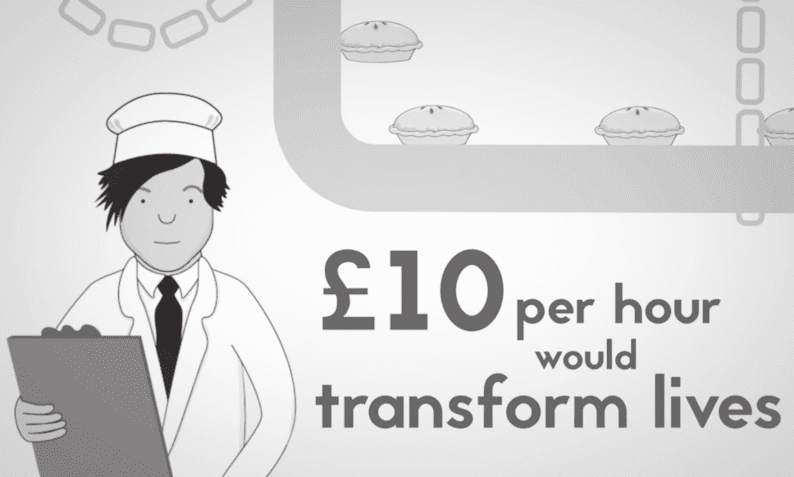
SSP national workplace organiser Richie Venton spoke to the Regional Officer of the Bakers, Food and Allied Workers’ Union, Alan Milne
Richie asked Alan about the background to his union moving the motion – passed unanimously! – that committed the British TUC to a national minimum wage of £10 per hour for all workers. They also discussed the BFAWU’s ‘Hungry for Justice’ campaign, which targets Fast Food workers to organise them and win a £10 minimum wage.
“We agreed at our national union conference to campaign for a £10 minimum wage.
“We since got support for it at the TUC conference. Part of what are doing is the Fast Food Campaign across the whole UK. We’ve already been on the streets of Glasgow, Edinburgh and Aberdeen.
“We want to explain to people that £10 is the basic minimum people can survive on. We need people spending again.
“A lot who work in the likes of McDonald’s, Burger King, KFC, and Starbucks are on the minimum wage and often Zero Hours Contracts.
Common sense
“They get help off the government in supplements. So we’re paying for people to work in companies like Starbucks whose profits go abroad.
“That will never make our economy viable.
“A £10 minimum would cut off a lot of benefits, but it would give people pride because they wouldn’t be relying on state handouts.
“They’d feel they were contributing to society, buying products, keeping others in a job. A lot of people think what we say makes common sense.
“I was listening to a Labour MP in Durham, one more on the left, at a Northern TUC meeting about the Living Wage, where we were as usual pushing for the £10.
“He couldn’t see anything wrong with it himself, but told us there are many in the Parliament think companies will pull out of the country if we push the minimum wage too high, or if we push too hard for them to pay taxes.
“But what if we didn’t have Starbucks on our high streets, what would happen?
“Somebody else would take over, maybe a local company, one paying taxes, unlike Starbucks.
“Why should we subsidise companies like this, when our money is going abroad through the profits they make?
“If companies were taxed right, all workers could have a £10 minimum, and more than that in many companies.
“It would give them a reasonable lifestyle, not a great one, but reasonable, and they’d be spending, paying taxes, helping the country to survive.
“Most of the Fast Food companies pay the National Minimum Wage. And the likes of McDonald’s, KFC, Burger King and the pubs also rely on Zero Hours Contracts.
Target low wages
“One company I was dealing with told workers ‘You’re not on Zero Hours Contracts, we will give you up to 40 hours a week’. Up to! It’s a joke.
“McDonald’s told people yes, we’ll give you work, it’s Zero Hours Contracts, but we’ll guarantee you four hours a week!
“Also, we have evidence that a majority of the people employed by these fast food companies are younger, meaning they’re on the lower rate of minimum wage, which makes a huge difference to the wage bill.
“We’re targeting these companies to put pressure on them. They don’t recognise unions or properly negotiate. We are linking up with similar campaigns in the USA.
“Now the USA is one of the most brutal societies when it comes to workers’ rights.
“But in Seattle they’ve won a $15 minimum, and it’s working for the state.
“I’ve no doubt the capitalist system will cry out against the Seattle minimum wage, but it’s working there, so why not in the UK too?”
This interview was printed in the Scottish Socialist Voice – issue 454.
